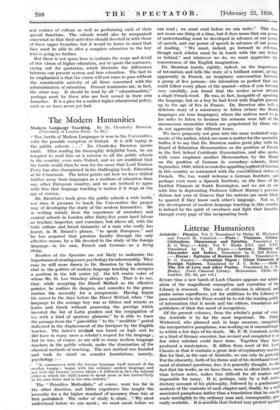The Modern Humanities
Modern Language Teaching. By Dr. Cloudesley Brereton. (University of London Press. 7s. 6d.) " THE battle of Modern Languages is won in the Universities, with the possible exception of Oxford. It is still raging in the public schools. . . ." Dr. Cloudesley Brereton speaks
truth. After reading his thoroughly delightful book, we are tempted to send him on a mission to all the public schools in the country, even unto Oxford, and we are confident that the battle would then be won for the cause that Lord Eustace Percy has also championed in his challenging book, Education at Ms Crossroads. The latter points out how we have drifted further away from languages as a medium of education than any other European country, and we are inclined to agree with him that language teaching is useless if it stops at the age of sixteen.
Dr. Brereton's book gives the public schools a wide berth, nor does it presume to teach the Universities the .proper way of developing the study of the modern humanities. He
is writing mainly from the experience of secondary and .central schools in London after thirty-five years hard labour *, :air teacher,- inspector; and examiner, but above all, with the vide culture and broad humanity of a man who really_ has .learnt, in M. Briand's phrase, " to speak European," and
rhe has acquired that precious faculty through the- only :effective means, by a life devoted to the study of the foreign
:language—in his case, French and German—as a living .,-thing.
Readers of the Spectator are not likely to underrate the -importance of creating a new psychology for salesmanship. They may be still more drawn to Dr. Brereton by his admission .that in the politics of modern language teaching he occupies .a position in the left centre (cf. the left centre voter of -whom Mr. St. Loe Strachey always spoke). That is to :say, -that, while accepting the Direct Method as the effective -pointer, he realizes its dangers, and concedes to the gram- marian the necessity for . a compromise. Having begun his career in the days before the Direct Method, when "the language to the average boy was as lifeless and remote as :Latin and. Greek without possessing the prestige which
Invested the list of Latin genders and the conjugation of :),sad with a kind of spurious glamour," he is able to trace :the passage from the " paleolithie " to the " neolithic " period
Indicated in the displacement of the foreigner by the English -teacher. The latter's method was based on logic and he did have in many cases a scholar's respect for the language ; but he was, of course, as are still so many modern langnage :teachers in the public schools, under the domination of_the :classical methods asf teaching. The new method was founded and took its stand on sounder foundations, namely, :psychology:
" It commenced with the foreign language itself instead of_the smother tongue ; began with the ordinary spoken language_ and -not with the literary written idiom ; it followed in fact the natural order in which the child learns to speak more or less instinctively qn- his own home and in his own country."
The " Primitive Methodists," of course, went too far in the other direction, and bitter experience has taught: the 'necessity for a far higher standard of accuracy than was at
=first postulated: The order of study is. A, clear, Iriust understand before we can speak ; we must speak before we can read ; we must read before we can write." This does not mean one thing at a time, but it does mean that our power of understanding must be developed in advance of our power of speech, and our power of speech in advance of our power of reading. " We must, indeed, go forward in echelons, though each echelon must be in touch with the one before or behind," and whatever we do, we must appreciate the concreteness of the English imagination.
Dr. Brereton insists, rightly, indeed, on the importance of intonation, and tells the story of a brilliant mimic, giving, apparently in French, an imaginary conversation between a group of five persons—the intonation so perfect that one could follow every phase of the quarrel—when if you listened very carefully, you found that the reciter never uttered a single French word. He was, in fact, incapable of speaking the language, but as a boy he had lived with English parents up to the age of five in France. Dr. Brereton also tells a delicious story of a missionary in Africa (where the Bantu languages are tone languages), whom the natives used to go for miles to listen to because his sermons were full of the unconscious enormities which are perpetrated by those who do not appreciate the different tones.
We have purposely not gone into the more technical argu- ments of the author, which are more a matter for the specialist. Suffice it to say that Dr. Brereton makes great play with the Board of Education Memorandum on the position of French in the first School Certificate- Examination, _and also quotes with some emphasis another Memorandum by the Board on the position of German in secondary. -schools, dated September, 1929, which reveals the appaffingneglecf-Of German in this country as contrasted with the convattonal status of French. We, too, would welcome a German Institute, and perhaps even more a Spanish Institute, on the lines of the Institut Francais at South Kensington, and we are at one with him in deprecating Professor Gilbert Murray's perverse dictum last year at Geneva that the nations are more likely to quarrel if they know: each other's hinguage. Not so, if the development of modern language teaching in this country is imbued by the spirit of sweetness and light that breathes through every page of this invigorating book.










































 Previous page
Previous page